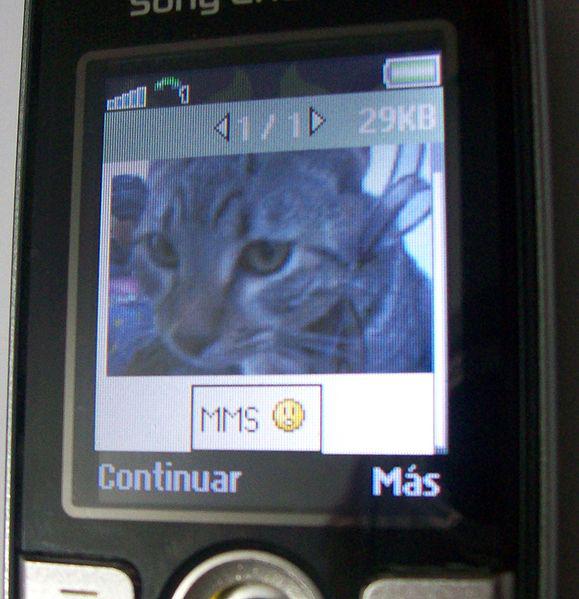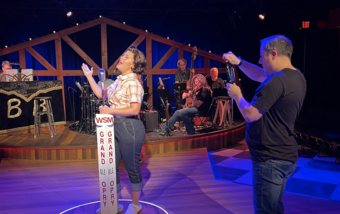You Have One New Message
Rethinking Our Response to Cell Phones in the Theatre
“We work hard on stage to create a world that is being totally destroyed by a few, rude, self-absorbed, and inconsiderate audience members who are controlled by their phones.”—Patti LuPone, after snatching a phone from a patron’s hands mid-show.
“I’ve learned a lot about the theatre in the past few days—theatre people are really passionate and have been very willing to educate me.”—Nick Silvestri, the Hand to God cell phone “cad.”

It was a rocky summer for the cell phones and theatre. After one audience member jumped onstage to charge his phone and a texter had her device swiped by Ms. Patti herself, AT&T tweeted an ad to advocate using your phone to watch the football game in the middle of a matinee.
This article isn’t intended to question the pros and cons of phone use at the theatre, but rather to question the industry’s response to these moments, and our culpability in them.
Attending theatre today is, in many ways, like entering an alternate universe. The rules of live theatre are different from almost any other realm of life: you can’t talk, use your phone, or eat or drink. Compare this to any other popular entertainment—movies, concerts, circus—and theatre is in a world of its own.
A great amount of time, energy, and resources are put towards bringing in new, non-traditional audiences. But what are we doing with those newbies once they arrive? How are we treating them to ensure they come back? We’re inviting them into our world—with its own rules and expectations—but are we doing enough to make them feel comfortable?
I recently took a job at an arts institution and in my first month there have been no fewer than five orientations on a variety of topics: the history of the institution, behind-the-scenes-tours, even an entire day dedicated to internal practices. Even with that orientation there are things I don’t know and questions I don’t have the answers to, but now I know who to speak with to find that answer. I am oriented.
A great amount of time, energy, and resources are put towards bringing in new, non-traditional audiences. But what are we doing with those newbies once they arrive? How are we treating them to ensure they come back?
At most theatres, the rules about cell phone use are expressed in two ways: signs in the lobby, which are easily overlooked in the crush of hundreds of people seeking for their seats, and via an announcement—often pre-recorded—played moments before the lights go down.
Think of any other instance in which a person is brought into a new world, and the orientation process is considerably more intimate and direct.
Think about customer service experiences that successfully welcome you to a world.
Flight attendant crews have recently begun turning the before-flight instructions about seat belts and air bags into entertainment. They take the boring (but legally required) information and spice it up, to the point that now many passengers expect this entertainment, and even look forward to it.
David’s Tea is a great company that goes above and beyond to immerse its customers in tea. I hate tea, or thought I did, before I went to David’s. For every customer who walks in, they ask, “Have you been here before?” and “Are you a tea drinker?” From there, they walk the customer through the options, offering suggestions, samples, and even getting the customer involved in the brewing process. You leave with a cup of tea, but also a greater appreciation about the world of tea, how it’s made, and all the options available.
Imagine if every Broadway house had a New-Theatre-Goer booth, where first-timers could check in for an overview of what to expect and meet a specific staff member personally dedicated to newcomers who can answer any questions. Maybe they even get a treat to say thanks—“Thank you for spending money and time to visit our world.”
Imagine a world where, instead of robotic voiceovers, the cast of every show performed a customized “turn off your phones and open your candy” announcement; an orientation into the world of the theatre, as well as the world of the play, clarifying the rules and expectations in a funny and personal way geared to that night’s show.
Imagine a world where new theatre-goers felt so well taken care of, and were so immersed in the world, that they couldn’t wait to come back.
The night after the cell-phone swipe, Ms. LuPone came out before the show to speak directly to the audience. It was a funny, emotional plea—a special treat from a star that clearly outlined the expectations of the world. You can bet no phones went off that night.
Much more effective than a pre-recorded voiceover.
In the instance of the “phone charge cad” at Hand To God, he leapt onstage before any such announcement was made. The show had not started—a fact captured by another audience member, using a cell phone.
In response, the theatre community erupted against this young man who “doesn’t go to the theatre much” and didn’t understand the rules: he was called “idiot,” and forced to give a public apology.
We in the community used this not as a teaching moment or a way to improve our standards for educating those who are open and willing enough to try us out—which considering the cost and the grandeur of a large theatre, can be an intimidating experience—but rather as a way to lambaste the “moron,” and a chance to show how witty and clever we are to mock new audience members who don’t know any better.
More and more venues and performances are allowing and even encouraging audience interaction via phone. Should every theatrical experience allow cell phones? No, of course not. Generally speaking, in a traditional theatrical experience, when the lights go dark, the phones should go off.
But that expectation is a rare thing in this world. And whatever the rules of a particular show may be, we do ourselves and our audiences—new or experienced—a disservice by not making those expectations clear for every single person present.
The bad news for theatre is that we live in a world full of hand-held technology, where word travels fast. And if the word travelling about our industry is that we bully newcomers who don’t know any better, those newcomers have more than enough alternative forms of entertainment to choose from. They don’t need us nearly as much as we need them.









Comments
The article is just the start of the conversation—we want to know what you think about this subject, too! HowlRound is a space for knowledge-sharing, and we welcome spirited, thoughtful, and on-topic dialogue. Find our full comments policy here
Silence isn't necessarily a default in today's theatre. When I've attended African American theatre, call and response is not unusual. And the audience members doing that are usually the most absorbed in the proceedings onstage of anyone in the audience. I'm feeling like questioning silence is akin to questioning gender and race parity in mainstream theatre.
For the record, a cell phone did indeed go off the night Patti gave her big pre-show speech.
Fine, to an extent. A tour perhaps, and maybe some goofy presentation at the beginning about cell phones. Though to be honest, if someone someone lacks the attention span to sit respectfully and watch at least the first Act of a play, I don't know if a cutesy presentation at the start is going to change that. Nor should any actor trying to get ready for a performance be forced into such a thing. (I can't imagine as an actor getting into character for something like Equus five minutes after dancing about on a unicycle juggling shut-off cell phones, or whatever other stunt would be used.
All that aside, what about accountability when the rules, in whatever precious way they are to be presented, are broken? Can we ask people to leave then, or is that being a "bully?"
If someone were drunk and yelling at the actors on stage, kibitzing with people trying to watch the show, or otherwise causing a non-cellphone related disturbance, would we be that patient in the interest of "welcoming everyone, even those who don't know any better?" Or would we insist that the interruption was an insult to all the work the cast and crew put into the show, the money spent to produce it, and the money spent to see it? My best guess is that we wouldn't be as lenient in this instance, and further would be less inclined to say, "well, he'd never been to a theatre before, and didn't know any better."
I'm sure there will always be people who bring up the Elizabethan groundlings and such, and historically they are correct. Plays were loud, rude, smelly, drunken affairs...FOUR HUNDRED YEARS AGO or more. Theatres didn't have flushing toilets back then, either. Once in a while, we need to accept that we've evolved beyond something in our past, and the arts are no exception. Not being an interruption to someone performing is not that difficult a concept to understand, even the cell phone age.
As for the "cad," I always smelled a rat in that story. I think he probably did it for attention and nothing more. But assuming he didn't, is it really a product of being raised in the internet generation to think it's okay to leap onto a stage being occupied for a specific purpose in order to charge a cell phone? I've never once been to a cricket game, but I'm fairly sure my running out onto the field during play to snap a selfie would be frowned upon, and nobody told me that. It's just something that a civilized person ought to know.
I agree that the theatre is in fact like another universe. But instead of letting non-theatrical things bleed into it, so people who are only 25% interested become 50% interested, I'd rather we embrace that "otherliness" a live production has, and find ways to both respect it and still remain solvent at the same time.
Or... imagine a world in which people are mature, intelligent, and respectful enough to put their phone away for a few hours without having to be coddled into compliance like children. That's the world I would prefer -- not the one in which we're all held hostage and need to provide special treatment to inconsiderate adults who should, by this point in their life, know how to behave in society. If they need to understand "the rules" of theater-going, they can google that information. The fact is that these people do know... they just don't care.
in at least one of the cases above, we're not referring to an adult. I'd be curious to know when and how you learned and fully understood that you were expected to turn off your phone during a performance (or that you were supposed to be quiet)?
One of my bigger points is that in today's world most experiences - including many forms of theatre - do NOT require the audience to behave as expected in a traditional theatrical setting. A great company in Boston - imaginary beasts - do a Winter Panto every year, where people are thoroughly encouraged to boo and hiss at the bad guy, cheer on the hero/ine, and actively interact. Each night the cast has to train the audience to know how to do this.
We absolutely should not coddle people and yes - wouldn't it be nice to imagine the world you describe? However we don't live in that world. We live in a world with a vast array of performance and entertainment. Theatre is a small subset of that and certainly has some of the most unique etiquette. I would personally rather see companies and artists putting creative efforts towards solving these issues in advance, rather than by responding after the fact (when the behavior has already had an impact).
I would say that I learned proper behavior in grade school. By 17 years old, we should really expect someone to know better (not to mention the fact that this kid, by his own admission, was drunk, so I'm not sure how your proposals would have changed that particular situation).
I would also say that if audience participation is expected as part of the experience, then that is a case in which you can let the audience know that. But the default setting, in any arts presentation, is a quiet appreciation of the performance. This isn't just consideration for the performers, but also for the other audience members who paid to experience the production, not the antics of an obnoxious audience member.
I don't think what you propose would make much of a difference. If you go to the movies, there are several "silence your cellphones" ads, many of them creative in the way that you describe -- but every time I go to the movies, there is at least one person who doesn't think it applies to them.
Considering the extent to which the arts have been removed from education in the past 15 years, and the relative newness of mass cell phone use (no other generation has grown up having to learn when it is or isn't appropriate to use them), I don't think it's fair or realistic to expect people to get out of grade school knowing these things. Who's teaching them theatre behavior when they aren't getting any kind of theatre - or arts - education in school?
And i would disagree that quiet appreciation is the default setting of any arts presentation, particularly if we're talking about relatively young and new arts-goers. Sure you and I might understand there are different expectations between a performance of HAMILTON and a Taylor Swift show, but they are very familiar with one and maybe not as familiar with the other. Who's teaching them the difference?
We can put that responsibility on anyone we want but the fact is that it's our world they're entering and our expectations we want them to comply with. I think it's fairly awful to suggest someone else take the responsibility for teaching them these things and if that fails, we just toss up our hands and put our energy into humiliating people.
Consider the bigger picture for a moment:
In the era of Sophocles, Aeschylus and Euripides, the theatre was one aspect of the Dionysian festival. Citizens ventured to the theatre on the outskirts of town, indulged in a wide variety of sometimes excessive behavior before, during and after watching the comedies and tragedies that so influence our concept of drama today.
The morality play of the early middle ages was a moveable feast also conjoined to feast days, festival days and holy days, often played on makeshift stages and even theatre carts in raucous town squares.
Shakespeare's theatre took place at mid-day, amid the bustle of a roiling London. It is supposed that the sounds of a bear baiting could be heard nearby as Burbage performed Hamlet.
Remember too that these iterations of performance included the audience as a living, breathing element which helped define the live theatre event.
Once the theatre moved indoors and the trajectory of gaslight to footlight to lighting grid took off, and the curtain was de facto, something strange happened.
The audience slowly disappeared as an integral part of the live theatre experience.
The rise of the cinema house and its habits in the 20th century was the final signal for the audience to quietly vanish, to be neither seen nor heard anon.
Theatre then learned how to become elitist, snobbish, petulant, narcissistic and self-important.
We in the profession spend countless resources on audience development, surveys, outreach, frills and bonuses in order to attract human beings to attend our art.
The first words a theatre goer hears from any theatre today after paying an obscene amount of money for a ticket is to be still, be grateful, be silent, be invisible.
From a meta- theatrical viewpoint I ask: what is the essence of the live theatre experience when the largest living thing in the room, the audience, is admonished to act as if they do not exist? Why are they treated as if they should be grateful we even deign to perform for them, and if they engage in any human behavior, they are deserving of a scolding?
I am a fan of Dame Lupone, and I certainly am not advocating an audience full of texting-talking-phoning-Facebooking people who don't have common courtesy or the ability to concentrate, but I think this issue is tied to a greater historical issue.
In a world where there is an ever diminishing number of events where human beings actually engage in real time and space, I ask why the theatre continues to journey down the road towards audience invisibility while at the same time despairing over dwindling numbers?
I recall reading an article about the excavation of the Globe when Sam Wannamaker was rebuilding it. They found layers of petrified orange peels and walnut shells where the groundlings once stood to listen to Shakespeare's words. Walnut shells! What was Burbage hearing as he worked through "To be or not to be...?" A bear shrieking its last, accompanied by a chorus of breaking nuts? I wonder if he stopped his performance and demanded quiet. I doubt it. I think he made eye contact with his audience and got them to listen by displaying something wonderful on the stage. I wish the theatre of today had the brass to do that, instead of drifting evermore towards scenic / costume / lighting spectacles in the dark. Remember where Aristotle placed spectacle in his order of dramatic elements? Last, I think.
If the theatre wants to re-engage its audience beyond orientations and admonishments, perhaps there is a simpler solution: turn on the damn lights, see the people who came to see you, and do something essentially theatrical to hold their attention. But this would require a complete abandonment of the habits of cinema, magic show, seance and / or museum. It would require understanding that theatre is about living people, artists and audiences.
It worked for Sophocles and Shakespeare.
I love your big picture thinking, Andrew. I actually want to work on a longer piece about some of those same ideas and history. I think we have largely lost / let go of the huge potential we have as artists sharing the space with our audience. And that's the one thing we have going for us that nothing else really does.
Great point, John, on taking the time and care to welcome people into our world. Many artists feel disrespected to the point of turning it towards new, uninformed audiences and students. How we treat those that aren't part of our tribe, is how we will be treated in turn.
I love your proposal to educate through joy rather than shaming tactics.
thanks Jess!